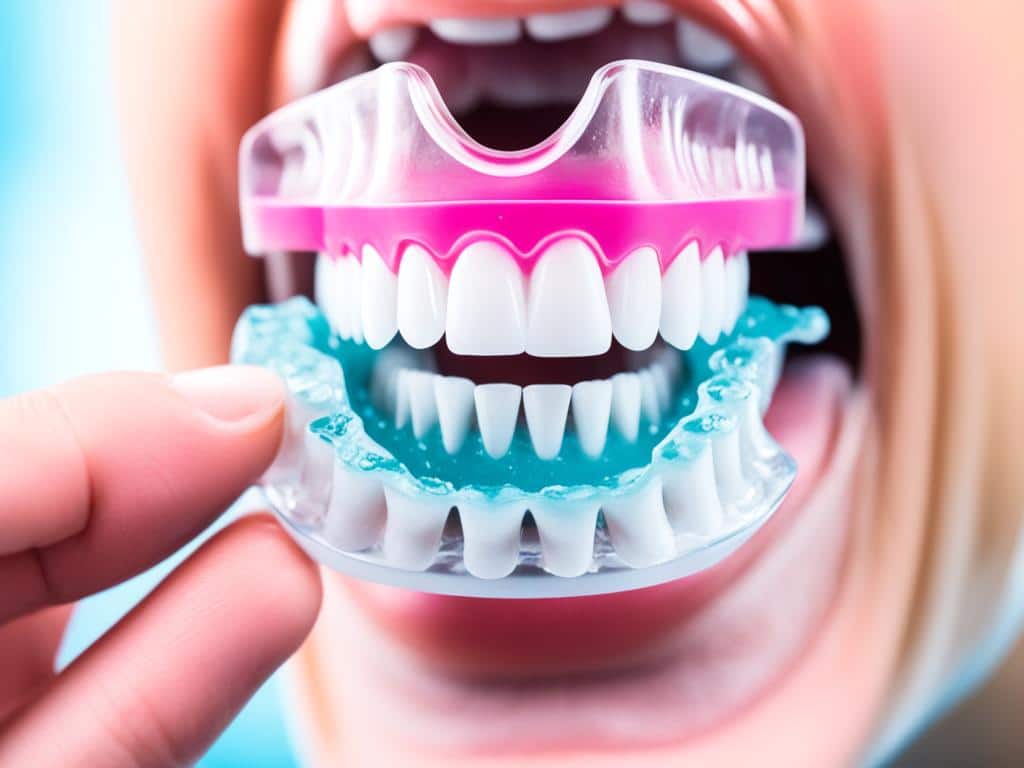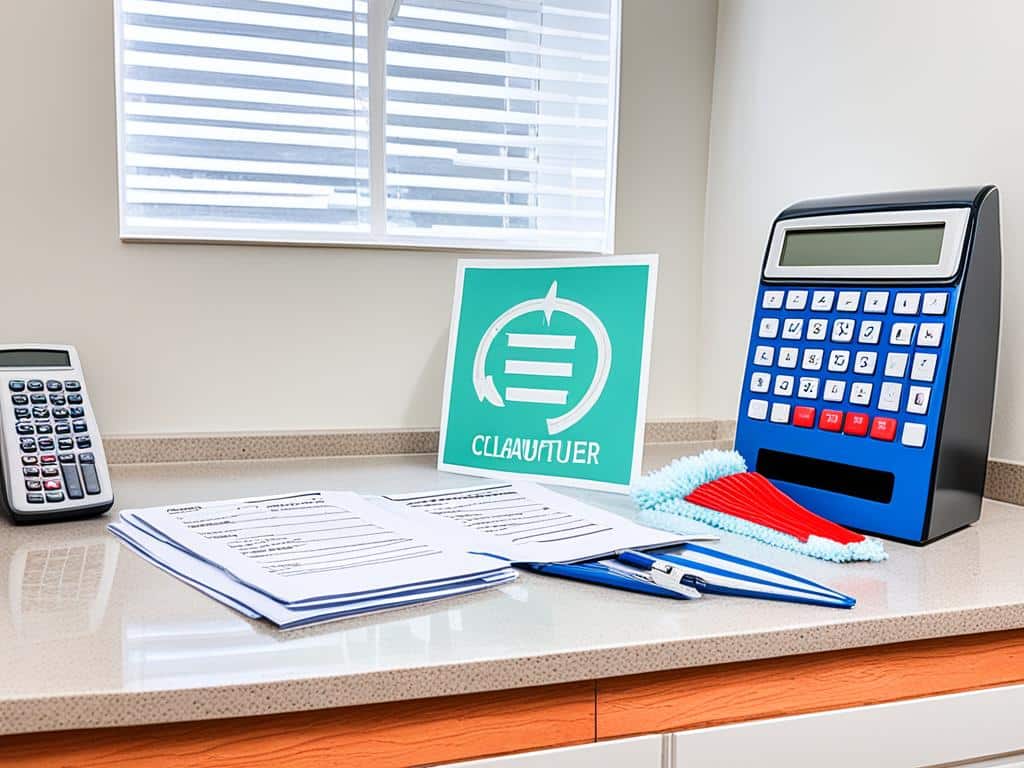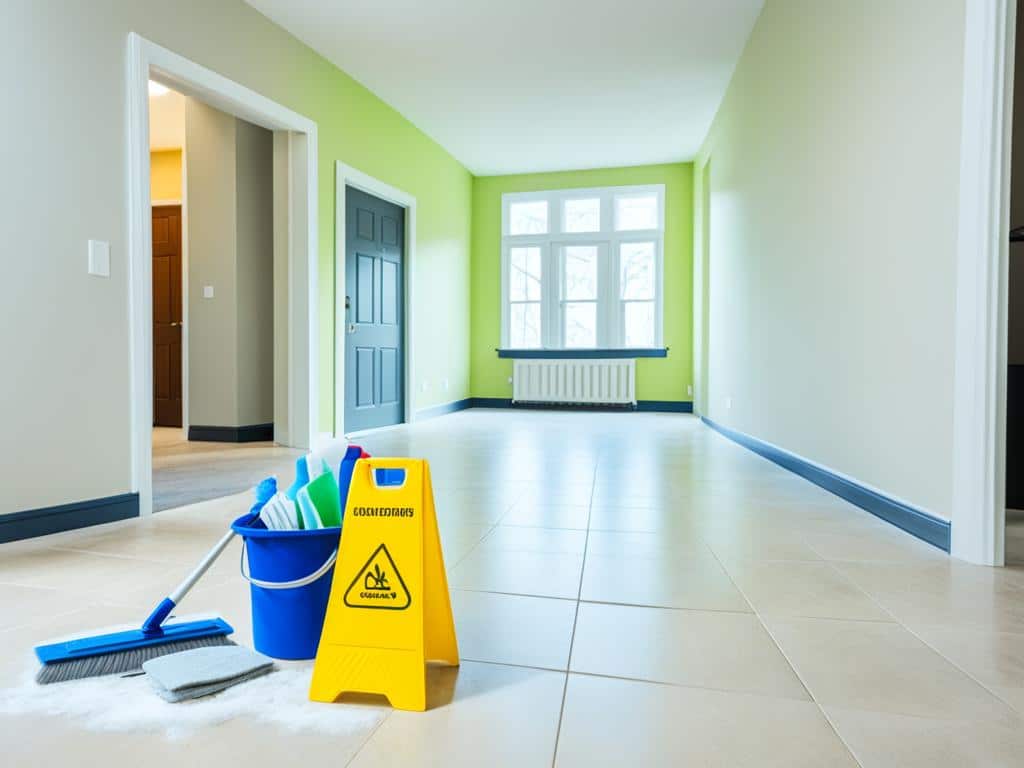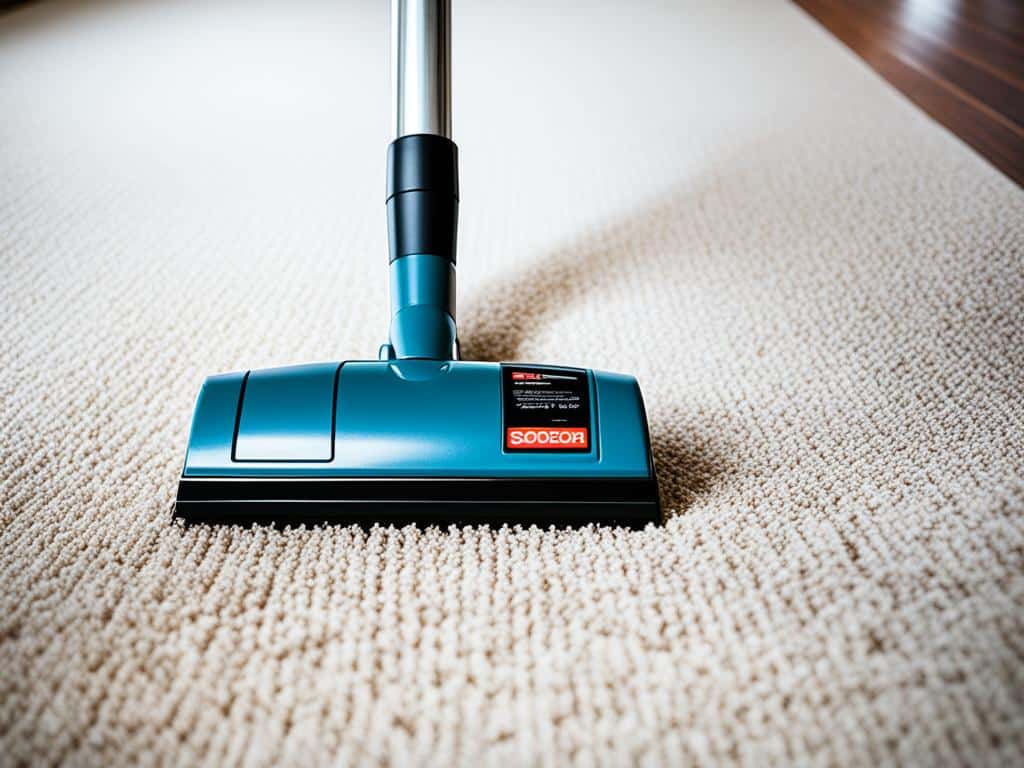
Have you ever wondered if that trusty denture cleaner sitting in your bathroom could double as a cleaning solution for your retainer? Retainer maintenance is vital for your oral health, stopping bacterial growth, and prolonging the life of your appliance.
Your retainer needs strict care, just like any dental appliance. It’s designed to keep your teeth in place after braces or other orthodontic work. A dirty retainer can lead to serious dental issues that compromise your dental care and overall health. With every day’s use, finding the right cleaning solution becomes crucial.
Many people assume denture cleaners, which are easily accessible and highly effective for dentures, could work for retainers too. But the materials used in retainers are delicate and might react differently. This raises a crucial question: Are denture cleaners the right choice for the safe cleaning of your orthodontic supplies?
Understanding Retainers: Types and Materials
Retainers, essential dental appliances, come in various types and are made from different materials. Each type has distinct characteristics and maintenance needs.
Types of Retainers
There are three main types of orthodontic retainers:
- Hawley Retainers: These traditional retainers use a combination of metal wires and acrylic. They’re adjustable and durable.
- Clear Retainers: Made from a clear plastic, these are less noticeable but can wear out faster.
- Fixed Retainers: Also known as permanent retainers, they’re bonded to the back of your teeth.
Materials Used in Retainers
Various materials are used in making orthodontic retainers, each serving a specific purpose:
- Acrylic: Common in Hawley retainers for its durability and ability to be customized in colors.
- Thermoplastic: Utilized in clear retainers, known for its transparency.
- Metal Wires: Integral to both Hawley retainers and fixed retainers for their strength and flexibility.
Differences Between Dentures and Retainers
It’s crucial to understand the differences between dentures and retainers:
| Feature | Retainers | Dentures |
|---|---|---|
| Purpose | Maintain teeth alignment | Replace missing teeth |
| Materials | Acrylic, Thermoplastic, Metal Wires | Acrylic, Metal, Porcelain |
| Usage | Temporary (often used post-braces) | Permanent (worn daily) |
Understanding these contrasts helps you maintain these dental appliances properly.
Why Keeping Your Retainer Clean Matters
Maintaining proper oral hygiene by keeping your retainer clean is essential for your dental health. Regular retainer care helps in preventing plaque buildup and ensures your breath stays fresh.
Health Benefits of Clean Retainers
Clean retainers offer numerous health benefits. They help prevent gum disease and tooth decay, which are critical for your overall well-being. Regular cleaning stops the formation of bacteria and calculus on the retainer, thus averting potential oral health complications.
Avoiding Stains and Odors
Keeping your retainer clean isn’t just about health. It’s also about ensuring it looks good and feels comfortable. Proper retainer care prevents unsightly stains and unpleasant odors, which can be socially embarrassing and might lead you to reduce retainer usage.
Can You Use Denture Cleaner To Clean Retainers?
Denture cleaning tablets are a popular solution for maintaining dental appliances. When considering their use for cleaning retainers, it’s essential to understand their functionality, ingredients, and overall effectiveness.
How Denture Cleaners Work
Denture cleaning tablets are designed to disinfect and remove stains from dentures. When dissolved in water, they create an effervescent cleaning solution that targets and breaks down organic debris and bacteria. Their active ingredients often include sodium bicarbonate, citric acid, and other antimicrobial agents, which work together to ensure thorough cleaning.
Are Denture Cleaners Safe for Retainers?
While denture cleaning tablets offer powerful cleaning capabilities, you need to consider their compatibility with retainer materials. Retainers are typically made from delicate plastics and metal wires that may react differently to the chemicals in denture cleaners. Dental professionals generally advise using retainer cleaning solutions specifically formulated for orthodontic care to ensure safety and longevity. Assessing manufacturers’ recommendations for both denture cleaners and retainer materials is crucial before making a decision.
Pros and Cons of Using Denture Cleaner for Retainers
Using denture cleaner to clean your retainer might seem like a good idea, but it’s essential to weigh the benefits and drawbacks. Here’s a closer look.
Advantages of Denture Cleaners
Denture cleaners can be highly effective at retainer disinfection. They are designed to remove stubborn stains and bacteria, making a retainer look and smell fresh. Another big plus is the accessibility and affordability of these products, making them a cost-effective retainer care option. With denture cleaning tablets readily available in stores, you don’t need to search far for a reliable cleaning solution.

Potential Disadvantages and Risks
However, there are some notable downsides. Many denture cleaners contain chemicals that might cause oral appliance damage, potentially harming the delicate materials of your retainer. Additionally, specific ingredients in these cleaners can lead to allergic reactions or irritation. Moreover, denture cleaners may not be formulated for the unique bacterial landscape of retainers, which could impact their effectiveness over time.
Alternative Cleaning Methods for Retainers
Keeping your retainer clean is essential for both your health and the longevity of the appliance. Luckily, there are various natural cleaning solutions that you can use to ensure your retainer remains safe and effective. Let’s dive into some safe cleaning agents that you can incorporate into your retainer care routine.
Using Baking Soda and Water
Baking soda is a natural and effective cleaner for your retainer. It’s gentle yet powerful enough to remove buildup without damaging the material.
- Mix one teaspoon of baking soda with a cup of warm water.
- Soak your retainer in the solution for 15-20 minutes.
- Rinse thoroughly with cool water before wearing it again.
This method is both cost-effective and easy to integrate into your daily retainer care routine.
Cleaning with Vinegar
Vinegar is another safe cleaning agent that can be used to keep your retainer in top shape. It is excellent for removing odors and disinfecting your retainer.
- Combine equal parts white vinegar and water in a small bowl.
- Soak your retainer for 15-30 minutes.
- Brush gently with a soft toothbrush, then rinse thoroughly with cool water.
Using vinegar is a natural cleaning solution that effectively maintains retainer hygiene.
Specialized Retainer Cleaning Products
For those who prefer products formulated specifically for retainers, several specialized cleaning products are available. These safe cleaning agents are designed to suit the specific materials used in retainers.
- Polident Retainer Cleaners
- Retainer Brite Tablets
- Dentek Professional Retainer Cleaner
These products offer convenience and are easy to incorporate into your retainer care routine.
Step-by-Step Guide: Cleaning Your Retainer
Keeping your retainer clean is crucial for your daily dental care. Following a routine will ensure your retainer stays fresh and free from bacteria. Let’s dive into both daily and deep cleaning methods.
Daily Cleaning Routine
Every day, start by rinsing your retainer with lukewarm water. Avoid hot water as it can warp the material. Use a soft-bristled toothbrush to gently brush the retainer, removing any food particles and debris. Incorporating this into your daily dental care routine helps prevent plaque buildup and keeps your retainer in excellent condition.
Additionally, make a habit of inspecting your retainer daily. Look for any signs of damage, which can affect the fit and effectiveness. If you notice any issues, contact your orthodontist for advice.
Deep Cleaning Tips and Tricks
For a thorough retainer cleanse, consider deep cleaning once a week. There are several methods you can use, including baking soda solutions and specialized products.
- Mix equal parts of baking soda and water to create a paste, then gently scrub the retainer.
- Use a retainer cleaning solution, soaking the retainer as per the instructions.
When deep cleaning, ensure you get into all the nooks and crannies. This deep cleanse is essential for maintaining retainers and keeping them free from harmful bacteria. Remember to rinse thoroughly after each cleaning session to avoid any residue.
By integrating both daily and deep cleaning practices into your routine, your retainer will remain in top shape, offering long-lasting performance and comfort.
Common Mistakes to Avoid While Cleaning Retainers
Keeping your retainers in pristine condition is crucial. However, it’s easy to make mistakes that might shorten their lifespan. Here’s what you need to know about managing retainer care efficiently.
Using Harsh Chemicals
Many folks think using strong chemicals ensures better cleaning. Yet, bleach or other abrasive substances can lead to retainer damage. For retainer longevity, opt for gentle cleansers.
Scrubbing Too Hard
Although it might seem like a good idea to scrub vigorously, this often results in scratches or physical damage. Properly cleaning your retainer involves gentle brushing and rinse techniques.
By being mindful of these common errors, you’ll ensure appropriate retainer care. This proactive approach not only safeguards against retainer damage prevention but also promotes the overall retainer longevity.
Conclusion
As you wrap up your journey on effective retainer maintenance, remember that proper care is essential for your oral health and the longevity of your retainer. Maintaining clean retainers is integral to optimal dental hygiene best practices. We’ve discussed whether using denture cleaners is appropriate for retainers and provided insights on various safe cleaning methods.
Our overview revealed that while denture cleaners can be effective, they carry certain risks, especially if not suited to retainer materials. By understanding the benefits and potential drawbacks, you can make an informed decision. Always consider alternative cleaning solutions like baking soda or specialized retainer cleaning products to ensure your retainer stays in prime condition.
Remember to follow manufacturer guidelines and dental advice to avoid common mistakes and preserve your retainer’s integrity. Proper retainer care not only keeps your teeth aligned but also prevents avoidable dental issues in the future. With the right care routine, you’re on the path to maintaining a healthy, bright smile!



